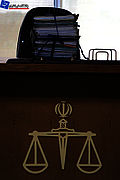Violence Breeds Violence
» Lawyers and Families of Azarbaijani Political Prisoners
Several civil and political activists in Azarbaijan were put on trial between April 26 and May 4, as a large number of residents in Tabriz were detained following a match between Teraktor Sazi and Saba football clubs.
A lawyer representing many of the detained Azarbaijani citizens tells Rooz in an interview that most of the arrests took place in violation of the Islamic republic’s penal laws and rules of criminal procedure. Meanwhile, the families of the some detainees say that their children are being held at the intelligence ministry’s detention center in Tabriz.
Mass Arrest of Football Fans
Following the arrest of some Azarbaijani citizens who were protesting the drying of Lake Urmia earlier this year, last week a large number of football fans were arrested following a contentious match between the Teraktor Sazi and Saba football clubs. Protests broke out around the square and in Tabriz city center following the match.
According to a report by ADAPP (Association for the Defense of Azarbaijan Political Prisoners), riot forces attacked the protesters with tear gas and batons, arresting large numbers.
Spring Trials
Meanwhile, a large number of civil and political prisoners in Azarbaijan were tried on various charges in Tabriz.
Some of them had been arrested while protesting the drying of Lake Urmia earlier this year. Amnesty International had earlier called for the release of these activists, who have been charged with propaganda against the Islamic republic, assembly and conspiracy to commit crimes against national security, and membership in prohibited groups.
Taghi Mahmoudi, who represents several of these activists, tells Rooz, “My clients have not accepted these charges, and they have not committed acts required by the burden of proof. Their activities were limited to holding gatherings at their residences and reading, essentially intellectual activities. The mere act of reading and engaging in intellectual analysis cannot be punished as a crime.”
Pressures seem to have increased on Azarbaijan’s civil and political activists following these arrests.
Taghi Mahmoudi says: “These pressures are nothing new. They started following protests in spring of 2006. In my opinion, they do not have any legal basis, because protests like this happen all over the world. For example, people protest against environmental degradation, and they are never mistreated. In my opinion, confronting this kind of criticism through violence itself breads violence. In general, violence breads violence. Civil activism in Azarbaijan has always been peaceful and limited to the issuance of statements and holding gatherings in defense of the environment.”


